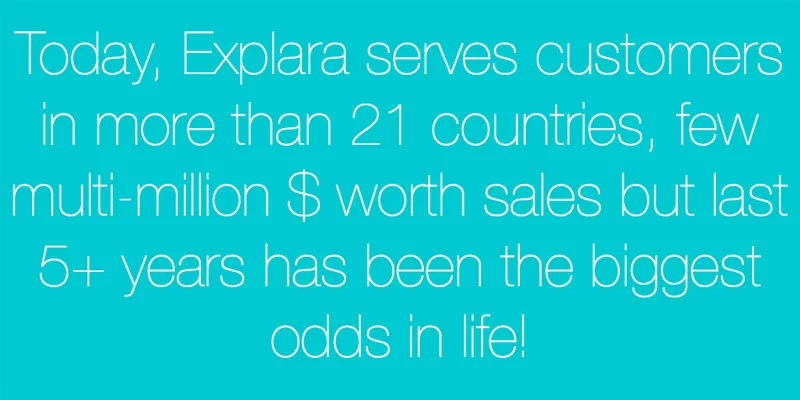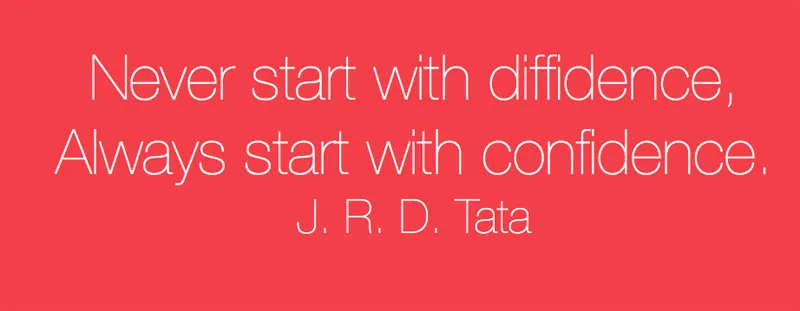When you try, try harder and fight deeper — A straight talk of my Startup journey
Editor's note: Santosh Panda is the CEO & Co-founder @Explara, a leading online event ticketing & registration platform. Brought up in a middle class family in Orissa, Santosh headed west to work but returned to start up on his own. The move wasn’t without his challenges. Here’s his story, straight from the horse’s mouth.
Childhood:
I was born & brought up in a rural urban city in Odisha.
During childhood, my father had a day job in a bank, but also had set up a dairy farm so he can earn a bit more money for giving a better education and life to me and my sisters.
When needed, I also distributed milk by going on a cycle to various customers, including some of my classmate and friends house.
I grew up hearing stories from my father on how people in my small towns built successful businesses with a little loan from the bank.
After an initial attempt to get into study medical and being unsuccessful, I did my engineering in Industrial & Production.

Fast Forward
Early in career, between 1998 to 2001, I travelled some 17 countries in Europe, USA, and South East Asia. I saw the world and it further influenced my passion towards entrepreneurship.
I then gave up a hugely double-paid salary ($ in Finland and Rs in India) and life in Helsinki, Finland to come back to Bangalore to work for a small startup.
This is during the year 1999/2000 when most IT professional in India were moving to west i.e. USA.
From Bangalore, we built some amazing products for the US market from India. I tested my creative mind and was ready to start. But I needed some money. This time I relocated to London & then to work with a small startup there.
I started a company in 2005 while living in London and went with a solution concept paper to University of Wales and Manchester University to acquire students their ‘higher education/study abroad’ programs for various studies.
Fail & Fail Again
Then I tasted my first failure! My co-founder and I couldn’t agree on investment and specifically my co-founder thought it is full of risk. We shut down but we are still friends.
I then started another company in 2006, with 2 other co-founders, one in Bangalore, other one in USA. We struggled with selecting services vs. products and more specifically which product. We also took several months to establish a bare minimum team.
We called off the venture after 5 months of starting up and no substantial progress.
I then began another startup in 2007, and this time I outsourced my product development to a team based in India. I had trained the team remotely from London using Skype and webcam. The company, which was developing my product, decided to let go several of team members. I was about to taste my 3rd failure.
I approached the founder, conveyed that I intend to take over the team (or few members) if he has no issues. Started the company in 2008, while I lived in London and remotely collaborated with my team.

Adversaries
The company was bootstrapped from 2008 to 2011 with a contracting job. Within 14 months of starting up, I ran out of money in February 2009. My uncle gave me a personal loan so I could pay a salary to my associates/employees for a month.
In May 2010, I ran out of money again. A childhood friend and an engineering classmate offered me money so that I could pay salary to my associates/employees for a month.
My wife and my first son had come to India for my son’s birthday in 2011 and their return VISA was rejected as I had no money in my bank account in UK. As per UK law, I couldn’t maintain my family’s basic needs.
So, I relocated to India in September 2011, pitched to my childhood friend and got his first few lakhs investment.
But I couldn’t take a salary as company needed money badly. My wife, & son lived in Odisha; whereas I lived in Pune for 2 more years.
There was not much appreciation in the family or among relatives for giving up a great life, salary & career in U.K.
Company Culture
Starting up from a remote location has resulted in an excellent culture and collaboration in the team.
We hired people who had an attitude and desire to do good work. We never hired anybody just because of their great educational qualification.
We had 100% open information sharing : We used Skype group conversation to share info/ chat, work & discuss, celebrate success/ express sadness, pretty much every communication was an open expression on Skype.
We never worked on weekends for the sake of it. We encouraged team to write beautiful software that works at night & we sleep peacefully.
We encouraged team to stay ethical and not win any customer with false promises. If we miss, we own & rectify it.
Collaboration
We used simple online tools & easy to follow process to enable remote collaboration.
We used Skype group conversation to share info/ chat, work & discuss, celebrate success/ express sadness, pretty much every communication was an open expression on Skype.
Collaboration tools for project management, document management, communications helped to bridge the gap among team and also among team and customers.
We even encouraged/influenced team members to access Orkut, Facebook, Twitter, almost open access to any social communities. This helped us source feedback/learn insights and we could even connect to Customer on these channels.
For instance, we could win 100s of customer (between 2008 to 2011) just via Twitter.
Failures
We have an open understanding in the company: Try, if you fail, there is no penalty. Rather, if you don’t try, you will lose lot of opportunity.
Don’t have to have the mindset that things will always go wrong, but let’s celebrate it when it does go wrong.
We started the company to solve ‘venue sourcing’ for events. We failed & pivoted to ‘Event Ticketing & registration’.
We failed several times during the product development, many customer had to suffer with changes/issues. We ensured we win them back with better products.
We grew to 600% but product name (it was called Ayojak earlier) couldn’t work across globe. We pivoted to a new brand “Explara”.
We are now working to lead several markets in various countries. We may fail.
Customer First
As I operated remotely, and we had established a culture of ‘kill the distance’ among myself & team. We extended the same to our customers.
The tone across the company was (& is) that we are passionate about reaching to our customers and delivering to their issue. So let’s kill the distance between us and the customer.
When there are issues (support, product, communication), its not about who is right, the customer has to be heard.
What will we expect if we were the customer? Make sure that we’re down to earth and tuned to life.
Keeping ethical and customer focused. If customer calls, we call them back within few minutes.
If you look at any part of the world it’s customer support that matters. The more customer focused you are the better world you’re building.

That’s my Startup Explara for YOU!
This article was originally posted on Medium.







